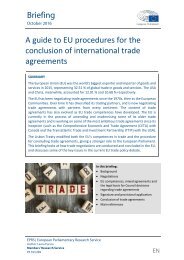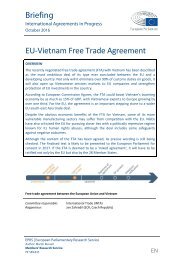Comprehensive Economic and Trade Agreement (CETA) with Canada
2iQ3UOo
2iQ3UOo
You also want an ePaper? Increase the reach of your titles
YUMPU automatically turns print PDFs into web optimized ePapers that Google loves.
EPRS<br />
<strong>Comprehensive</strong> <strong>Economic</strong> <strong>and</strong> <strong>Trade</strong> <strong>Agreement</strong> <strong>with</strong> <strong>Canada</strong><br />
The changes the agreement would bring<br />
<strong>CETA</strong> regulates trade in goods <strong>and</strong> services as well as investment relations between the<br />
EU <strong>and</strong> <strong>Canada</strong>. It further deals <strong>with</strong> topics such as Rules of Origin (RoO), sanitary <strong>and</strong><br />
phytosanitary rules (SPS), technical barriers to trade (TBT), customs <strong>and</strong> trade facilitation,<br />
intellectual property rights (IPR), regulatory cooperation, sustainable development <strong>and</strong><br />
government procurement. <strong>CETA</strong> also establishes a number of joint committees to<br />
accompany the implementation <strong>and</strong> the further development of rules initiated by <strong>CETA</strong>.<br />
<strong>Trade</strong> in goods<br />
Except for a few sensitive agricultural products, the agreement would remove practically<br />
all tariffs on goods exchanged between the two partners, <strong>and</strong> create considerable new<br />
market opportunities in, among other areas, financial services, telecommunications,<br />
energy <strong>and</strong> maritime transport, while reserving the parties' right to regulate their internal<br />
public affairs. 2 While customs on the majority of tariff lines are to be eliminated<br />
immediately upon the date of entry into force, liberalisation of trade in certain sensitive<br />
agricultural products happens over time – in stages specified in Annex 2-A.<br />
<strong>Trade</strong> in services: public services <strong>and</strong> utilities<br />
There is no separate chapter on public services. However, <strong>CETA</strong> introduces a public sector<br />
carve-out (Articles 8.2 <strong>and</strong> 9.2), which exempts 'services supplied in the exercise of<br />
governmental authority' from the application of the chapter on trade in services <strong>and</strong><br />
certain elements of the investment chapter, upon the condition that they are not carried<br />
out – neither on a commercial basis, nor in competition <strong>with</strong> one or more economic<br />
operators. 3 As these conditions significantly limit the scope of the carve-out, the EU<br />
introduced additional reservations for specific public services, such as health, social <strong>and</strong><br />
education services, postal services, public utilities, collection <strong>and</strong> purification of water,<br />
educational services, human health services <strong>and</strong> social services, 4 in order to be able to<br />
further regulate these services even when they are offered in a competitive way (<strong>and</strong><br />
thus do not fall under the public sector carve-out) or to provide, for the reservations<br />
placed in Annex II, for the possibility to re-nationalise services at some point in the future.<br />
Novelties in the investment chapter<br />
<strong>CETA</strong> introduces several novelties in the investment chapter. It reaffirms the parties’ right<br />
to regulate 'to achieve legitimate policy objectives, such as protection of public health,<br />
safety, the environment or public morals, social or consumer protection or the promotion<br />
of cultural diversity'. New public policy measures are also better protected against<br />
potential claims by foreign investors, as negative effects on an investment or on investor’s<br />
expectations, including the expectations of profits, do not by themselves give grounds to<br />
a claim against the regulating country (Article 8.9). Moreover, <strong>CETA</strong> specifies investment<br />
protection st<strong>and</strong>ards to bind future members of investment tribunals. In particular, a<br />
breach of 'fair <strong>and</strong> equitable treatment' must comprise a denial of justice in criminal, civil<br />
or administrative proceedings; fundamental breach of due process, including a<br />
fundamental breach of transparency, in judicial <strong>and</strong> administrative proceedings; manifest<br />
arbitrariness; targeted discrimination on manifestly wrongful grounds, such as gender,<br />
race or religious belief; or abusive treatment of investors, such as coercion, duress <strong>and</strong><br />
harassment. In the future, the parties may adopt further specifications on what might<br />
constitute a breach of fair <strong>and</strong> equitable treatment (Article 8.10). Furthermore, <strong>CETA</strong><br />
clarifies what constitutes 'indirect expropriation', to avoid claims against legitimate public<br />
policy measures (Article 8.12 <strong>and</strong> Annex 8-A).<br />
Members' Research Service Page 5 of 11




